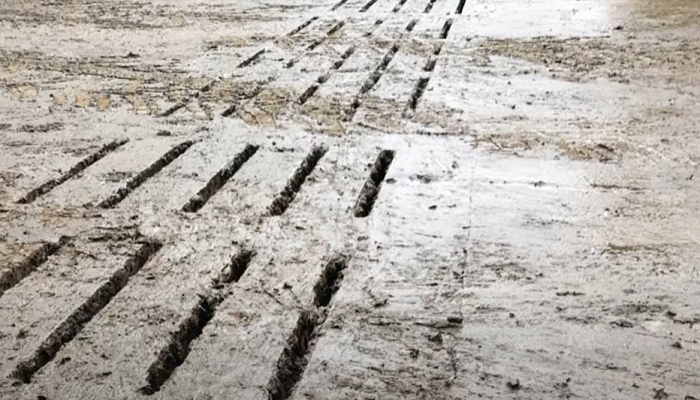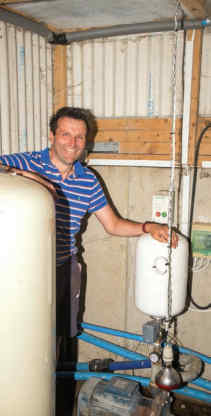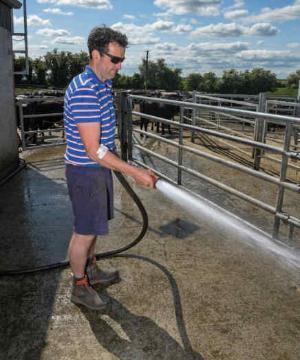08 August 2023
Raising soil water storage capacity to meet new requirements

From December 1st 2023, dairy farmers will be obliged to have capacity to store 21 days’ worth of soiled water. Many farms will need to raise their storage capacity to meet the new requirements. TAMS can help. Tom Fallon, Teagasc Infrastructure Specialist, has some guidelines.
Soiled water results mainly from parlour washings, but also includes runoff from open silage pits, etc. The soiled water storage requirement will increasse from 21 days to 31 days in December 2024. Farmers supplying liquid or winter milk will have a further year to meet the 31-day requirement.
Spreading soiled water on land will not be allowed during the final three weeks of this year. The storage requirement is for the cow numbers milked at peak during the year and does not relate to the numbers milked during December. Nevertheless, farmers milking cows through December need to provide ample storage to comply with the new closed period.
Parlour washings
The amount of parlour washings produced on farms varies a lot. It depends on the type of parlour and the area cleaned with a volume washer, etc. The volume of dairy washings and slurry produced per cow is under review in the Nitrates Action Programme. On many dairy farms, there is a slatted tank in the collecting yard and the milking machine and bulk tank washings are pumped into it. These farmers will have a good idea of how much parlour washings they are generating by virtue of the time it takes to fill this tank.
Another possibility is to estimate soiled water production by measuring the duration of wash down by the output of the washdown hose. The typical volume of parlour washings produced on farms is 30L/cow/day or 0.21m3/week. Rainfall on unroofed collecting and return yards may bring the storage requirement up to about 40L/cow/day.
It’s worth noting that if cows are eating silage while standing in the collecting yard, the contents of the tank is regarded as slurry and it has to be stored from the 1st of October until the end of the closed period for spreading slurry. It is acceptable to store parlour washings in slurry tanks, but it has to be stored for the full closed period. Parlour washings are classified as soiled water provided they have a biochemical oxygen demand (BOD) of less than 2,500 and a dry matter content of less than 1%.
Complying with the new requirements on farm
 Tom and Ruth Downey own Golden Amber Dairy and milk 300 cows near Golden, Co Tipperary. Mick Dawson manages the farm and they employ a full-time student Stephanie Stanley, who is doing the new UCC/Teagasc degree in agricultural science.
Tom and Ruth Downey own Golden Amber Dairy and milk 300 cows near Golden, Co Tipperary. Mick Dawson manages the farm and they employ a full-time student Stephanie Stanley, who is doing the new UCC/Teagasc degree in agricultural science.
“The full herd is dried off on December 15th with milking recommencing on February 1st,” said Tom, who is pictured with two of his water pumps.
“There is approximately 33% extra slurry storage on the farm above the minimum required, thanks to a large overground slurry tower.” This means that the farm is under no pressure to spread soiled water or slurry during the winter. The two existing collecting yard tanks have a capacity of 190m3, but they can fill in two weeks.
Double the existing soiled water storage required
 The farm is generating about 45L/cow/day of soiled water. “This reflects the fact that we completely wash down the collecting yard after each milking,” Tom said.
The farm is generating about 45L/cow/day of soiled water. “This reflects the fact that we completely wash down the collecting yard after each milking,” Tom said.
It is clear that the farm needs to provide more than double the existing soiled water storage. “We plan to put in an underpass and extend the collecting yard. This will involve a new double tank. Currently cows can be held after milking in the spring for on/off grazing. The proposed tank at the back of the collecting yard will provide for this,” Tom expalined. Tom is pictured in his collecting yard.
The yard is too rough in places to install an automatic scraper. The two existing tanks are connected via a 250mm pipe near the surface.
“We get a contractor to clean the silage pits and yards two to three times a month,” said Tom Downey. “We plan to eventually buy our own yard sweeper. This is important because the runoff from open silage pits is regarded as soiled water unless it is kept clean.”
TAMS and accelerated capital allowances
Additional soiled water storage is eligible for grant aid under TAMS III. Planning permission must be sought and submitted when applying for TAMS. Slurry / soiled water and farmyard manure storage, automatic scrapers, simple slurry aeration systems and the floors and walls of buildings used to house animals are eligible for a two-year write-off against income tax. The Finance Bill Section 658A specifies that slurry / soiled water stores have to be covered. Slats meet this cover requirement.
3 tips to reduce your soiled water
- Scrape yards instead of washing, where possible.
- Reduce the soiled area. For example, by confining cows leaving the parlour to a drafting chute. Holding yards where cows are held for AI will be clean for most of the year and any clean runoff should be diverted away from tanks where appropriate.
- Switch from a high-volume low-pressure washer, typically having an output of 182L/minute of water to a low volume (45L/minute) medium pressure washer.
This article first appeared in the July/August edition of Today’s Farm.
